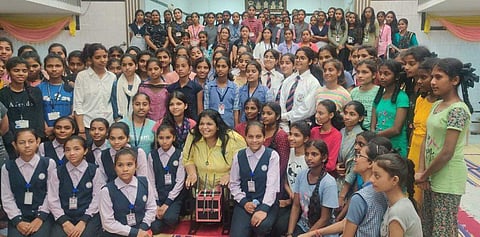

In India, we celebrate the promise of our nation's young women in Science, Technology, Engineering, Math (STEM). With nearly half of our youth being girls, comprising approximately 48% of the population aged 15-24, the potential for innovation and progress is boundless.
However, systemic barriers persist, hindering women's participation in STEM. Limited access to quality education, societal expectations, and gender biases create a daunting landscape for aspiring female scientists and engineers.
Globally, countries like Sweden and Finland have made significant strides in increasing women's participation in STEM occupations. In Sweden, for example, women represent over 33% of the STEM workforce, while in Finland, they comprise approximately 32%. In contrast, India's representation of women in STEM fields remains comparatively lower, with women accounting for only around 14% of the STEM workforce.
Despite the disparities in representation, various countries have established awards and rewards to recognise outstanding achievements in STEM. Honours such as the Nobel Prize in Physics, Chemistry, and Medicine celebrate groundbreaking contributions to scientific knowledge. However, there persists a noticeable lack of representation of women and minorities among the recipients. For instance, as of 2020, only 57 women have been awarded the Nobel Prize in Physics, Chemistry, or Medicine, compared to 572 men.
To address these challenges and foster a more inclusive STEM ecosystem, initiatives like STEAM (Science, Technology, Engineering, Arts, and Mathematics) education have emerged. STEAM integrates arts and design into traditional STEM subjects, recognising the interdisciplinary nature of innovation and creativity. By embracing STEAM, we can broaden participation in STEM fields and encourage diverse perspectives, ultimately driving greater innovation and societal impact.
Yet, there is hope. By investing in inclusive education, providing mentorship, and challenging stereotypes, we can create a supportive environment where every young woman feels empowered to pursue her dreams in STEM.
Initiatives like KIRAN and STEAM education integration are steps in the right direction, offering pathways for women to thrive in STEM.
Through initiatives like AzaadiSAT, Space Kidz India, a pioneer in the field of SpaceTech, contributes to India’s growing presence in space exploration and nurtures the next generation of space scientists and
engineers. The satellite’s name, Azaadi, underscores the theme of freedom and independence, reflecting the organisation’s mission to break barriers and provide opportunities for rural students to explore the realms of space science and technology.
Furthermore, we urge the government to promote women leaders to top positions in STEM sectors, showcasing their achievements and serving as role models. Additionally, creating awareness campaigns to encourage women to sign up for STEM platforms and expand their participation can significantly contribute to making STEM opportunities more accessible and inclusive for all.
Together, let us nurture the potential of women in India, breaking down barriers and paving the way for a future where STEM is truly inclusive.
